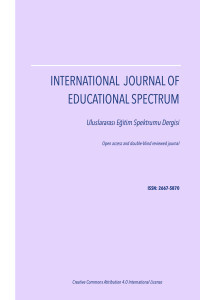Biyoloji Öğretiminde Gerekli Görülen Öğretim Stratejilerinin Belirlenmesi
Determination of Teaching Strategies Considered Necessary in Teaching Biology
biological, education research,
___
- Babayeva, Z. (2011) Use of ICT in Biology teaching: interactive and conventional (education tuto¬ri¬al) “Tehsil” NPS, Baku, 178 p.
- Babayeva, Z. (2016). Condition of using innovations in teaching biology. Transylvanian Re¬vi-ew journal, (ISSN 1221-1249). Tomson Reuters:Vol XXIV, No.06, p.346-353
- Babayeva, Z. (2020). The school of the digital age - electronic educational resources in the teaching of biology. "Scientific works" of Nakhchivan State University. Nature and Medicine Series 3 (104), 238-241
- Babayeva, Z. (2021) Prospects for the application of the STEAM method in teaching biology. I International Scientific and Practical Conference "Scientific Goals and Purposes in XXI Century", USA https://www.interconf.top/archive.html
- Babayeva, Z. (2021). Concept of a modern course in teaching biology. VIII International Scientific-Practical Conference "International forum: Problems and scientific solutions" (September 6-8, 2021 Melbourne, Australia)
- Babayeva, Z. (2023). Biology teaching methodology, textbook. Baku, "Zangezurda" printing house, 260 pages.
- Babayeva, Z. (2023). New challenges in education - turning biological knowledge into skills. www.ustac.az https://yazarlar.az
- Babayeva, Z. (2023). Use of new learning technologies in biology teaching. Monograph, Baku, "Zangezurda" publishing house, 260 pages.
- Dyachkova, M.A. (2016) О.N. Tomuk, “Innovations and Philosophical Education in a Modern University”, Philosophy in the XXI century: challenges, values, prospects: Collection of articles. O. N. Tomyuk and A. V. Loginov, Eds. Ekaterinburg: Max-Info Publishing and Printing Enterprise, pp. 104-108.
- EU Commission. (2015). What is LifeLong Learning? http://ec.europa.eu/education/policies/lll/life/what_islll_en.html. 10.09.2019
- Gardiner, P. (2017). Playwriting and flow: The interconnection between creativity, engagement and skill development. International Journal of Education & the Arts, 18(6).
- Hua, M. (2022). Pathways to successful transformation of basic education amid educational crises: A case study of the experiments in educational reform by 271 Education Group. Science Insights Education Frontiers, 13(2), 1899-1909.
- Huseynov A.M., Abdullayeva T. Modern methodology of teaching biology. Textbook, printing house of ADPU, 2012, 184 pages.
- Iowa State University. (2022). Informed consent templates. Informed Consent Templates | Office of Research Ethics. (October 19). from https://www.compliance.iastate.edu/committees/irb/informed-consent-templates
- Jackson, N. (2011). The lifelong and lifewide dimensions of living and learning. In N. Jackson (Eds.), Learning for a complex world (p.22-38). USA: Author House.
- Jin, H. Y., Su, C. Y., & Chen, C. H. (2021). Perceptions of teachers regarding the perceived implementation of creative pedagogy in “making” activities. The Journal of Educational Research, 114(1), 29-39.
- Kettler, T., Lamb, K. N., Willerson, A., & Mullet, D. R. (2018). Teachers’ perceptions of creativity in the classroom. Creativity Research Journal, 30(2), 164-171.
- Langley, D. W. (2018). Students’ and teachers’ perceptions of creativity in middle and high school choral ensembles. Music Education Research, 20(4), 446-462.
- Lee, I., & Park, J. (2021). Student, Parent and Teacher Perceptions on the Behavioral Characteristics of Scientific Creativity and the Implications to Enhance Students' Scientific Creativity. Journal of Baltic Science Education, 20(1), 67-79.
- McCallum, A. (2016). Dangerous and uncontrollable: the politics of creativity in secondary English. English in Education, 50(1), 72-84.
- Miyoung, H. & Kang, N.-H. (2009). South Korean and the US secondary school science teachers’ conceptions of creativity and teaching for creativity. International Journal of Science and Mathematics Education, 8(5), 821-843. ENMU Golden Library.
- Ndeke, G.C.W., Okere, M.I.O. & Keraro, F.N. (2016). Secondary school biology teachers’ perceptions of scientific creativity. Journal of Education and Learning, 5(1). ENMU Golden Library. http://dx.doi.org/10.5539/jel.v5n1p31
- Polat, M. & Kontaş, H. (2018). Critical thinking dispositions of classroom teachers examination. Electronic Journal of Social Sciences, 17(65), 142-159.
- Sahin, F., & Sasmaz Oren, F. (2022). Laboratory as an Instrument in Improving the Scientific Reasoning Skills of Pre-Service Science Teachers with Different Cognitive Styles. Science Insights Education Frontiers, 13(2), 1875-1897.
- Shaughnessy, M.F., Brazzolotto, M. & Phelps, C. (2022). Curriculum: Development & education of creativity. Overarching components of creative curriculum concerns [Symposium]. Marconi Institute for Creativity Conference, Bologna, Italy.
- Tümkaya, S. & Ulum, H. (2019). Investigation of Organizational Commitment in Teachers in Terms of Various Variables: A Meta-Analysis Study. Kastamonu Journal of Education , 27 (3) , 1103-1121.
- UNESCO. (2021). Reimagining Our Futures Together: A New Social Contract for Education. UNESCO. (2021-11-2). Available at: https://unesdoc.unesco.org/ark:/48223/pf0000379707?3=null&queryld=28abb3be44fa-41c8-accc-004b75d2ad95
- Wilson, A. & Myhill, D.A. (2012). Ways with words: Teachers’ personal epistemologies of the role of metalanguage in the teaching of poetry writing. Language and Education, 26(6), 553-568. ENMU Golden Library. http://dx.doi.org/10.1080/09500782.2012.669768
- Yılmaz, A. (2009). Public policies and public library-emergent literacy relationship in the USA. Knowledge World, 10, 80-94. http://www.bd.org.tr/
- Yılmaz, B., Köse, E. & Korkut, Ş. (2008). A study on the reading habits of Hacettepe University and Bilkent University students. Turkish Librarianship, 23, 22-51. http://www.tk.org.tr
- ISSN: 2667-5870
- Yayın Aralığı: Yılda 2 Sayı
- Başlangıç: 2019
- Yayıncı: Hakan ULUM
Online Extensive Reading: A Friend or Foe
Mevlüdiye UCAÇELİK, Ahmet ŞAHAN
Biyoloji Öğretiminde Gerekli Görülen Öğretim Stratejilerinin Belirlenmesi
Middle School Science and Mathematics Teachers' Views on Science-Mathematics Integration
Kürşat KURT, Kemal İZCİ, Mustafa PEHLİVAN
Stress Experienced by Special Education Teachers and Coping with Stress
Fulya AKGÜL, İsmail ÇELİK, Özcan İKBAL, Serkan ATİLLA, İbrahim KUZ, Gökmen KEKLİK, Abdullah SADAN
Personal Entrepreneurial Competences among English Students in Entrepreneurship Education
Yüksek Öğretimde Çevrimiçi Öğrenci Katılımı: Bölüm 1 – Teori
Okula Başlama Yaşı: Okula Başlama Kararında Esnek Bırakılan Üç Ay ve Ötesi
Differential Influence of Demographic Variables on Dyscalculia Dimensions
